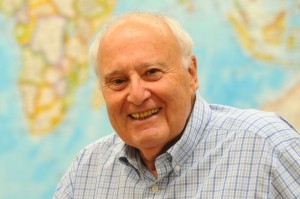Arnold L. Gordon Honored: Marking a Legacy of Ocean Discoveries
The American Meteorological Society will award him the Henry Stommel Research Medal for his research on the Southern Ocean and inter-basin circulation.
Lamont physical oceanographer Arnold Gordon has spent more than 50 years studying the ocean, its stratification, circulation, and mixing and its role in Earth’s climate system. His research has expanded humanity’s understanding of the sea with transformative discoveries. Along the way he has amassed several awards: the 2013 Prince Albert 1 Medal for outstanding contributions to oceanography from the International Association for the Physical Sciences of the Ocean; in 1999, the Maurice Ewing Medal for outstanding service to the marine sciences from the American Geophysical Union; and in 1984, the Henry Bryant Bigelow Medal for those who make “significant inquiries into the phenomena of the sea” from Woods Hole Oceanographic Institution.

The long-time Lamont scientist now adds another recognition to his collection. The American Meteorological Society has announced it will award the Henry Stommel Research Medal “for pioneering observational studies that have fundamentally advanced our understanding of Southern Ocean and inter-basin circulation” to Gordon at its annual meeting in January. This honor holds particular meaning for Gordon considering its namesake. Henry Stommel spent much of his career at Woods Hole Oceanographic Institution and was also a major contributor to the field of physical oceanography. Beginning in the 1940s, Stommel advanced theories about global ocean circulation patterns and the behavior of the Gulf Stream, findings that form the basis of physical oceanography today. Stommel died in 1992.
“I knew Hank Stommel well. Receiving an award named after a giant in the field of physical oceanography, whom I knew, is very meaningful to me. I spent a lot of time at the Woods Hole Oceanographic Institution beginning with my graduate student days of the early 1960s; I spoke with Hank often. Stommel was driven by observations, coupled with basic concepts of ocean dynamics,” said Gordon.
Observations, some quite unexpected, have shaped Gordon’s research career as well.
“Some of the random observations I have made from a ship, have led to discovery and a new field of research: open ocean convection in the Weddell Sea; leakage of Indian Ocean water into the South Atlantic (Agulhas leakage), and how the Indonesian throughflow is a lot colder than we thought.” These features tell us how the exchange between the major ocean basins are interconnected, and how the surface waters can reach into, and ventilate, the deep ocean. They reveal the nature of 3D circulation of the global ocean, a key part of the Earth’s climate system.
Gordon’s life story has been one of high-sea exploration and deep-sea investigation, stemming from a fascination and love for the ocean. He believes the discovery cited by the AMS award, his work characterizing the Southern Ocean and inter-basin circulation, is among his most significant contributions as it has added significantly to our understanding of ocean global scale circulation and overturning.
“My Southern Ocean research spans a broad range of topics, from the Antarctic Circumpolar Current to the regional oceanography of the Ross Sea, the Weddell Sea, and the drivers of the sea ice cover. More recently I’ve been involved in investigating how bottom water export from the Weddell Sea changes in time,” said Gordon. “I tend to go to areas that have been neglected by the research community, but have the potential of being key players in the global system.”
Today Gordon continues his pursuit, but the tools in his toolbox have become quite sophisticated.
“In the recent decades there has been an explosion of ocean observations, from remote observations from space and from in situ sensors on global arrays (Argo floats, surface drifters) transmitting data via satellite and sustained ocean mooring arrays. This provides a more detailed view of the spatial and temporal patterns of ocean behavior.”
Gordon has been monitoring mooring arrays that record the Indonesian throughflow (since 2004) and outflow of Antarctic bottom water from the Weddell Sea (since 1999). He has observed the Indonesian throughflow and Weddell Sea bottom water export both experienced strange shifts since 2014.
“We are presently trying to find out why, the changes in ‘hot’ surface and thermocline waters of the Pacific Ocean spreading into the Indian Ocean within the Indonesian Seas are coupled with changes in the ‘cold’ bottom water exported from the Weddell Sea. A coincidence? I doubt it,” Gordon said. Such questions continue to drive this veteran of deep ocean investigation as do profound concerns about the future oceans. He is encouraged that the general population is beginning to appreciate the threat of global warming to the sea.
“There is increased public awareness about the impact of anthropogenic activities on the marine ecosystem, which includes warming and acidification’s destructive effect on coral reefs,” Gordon said. “The marine ecosystem is under great stress, hopefully the increased public awareness will help save the marine environment, but enormous challenges remain.”
